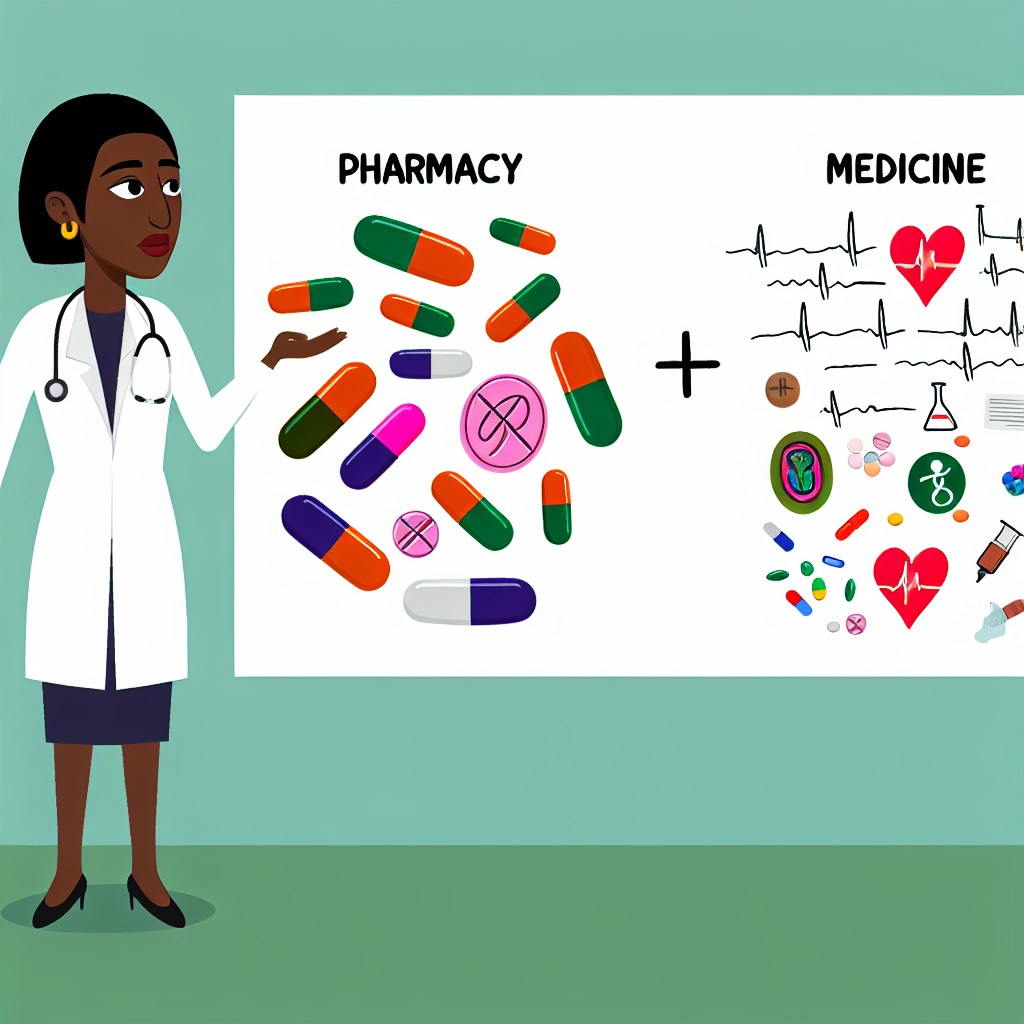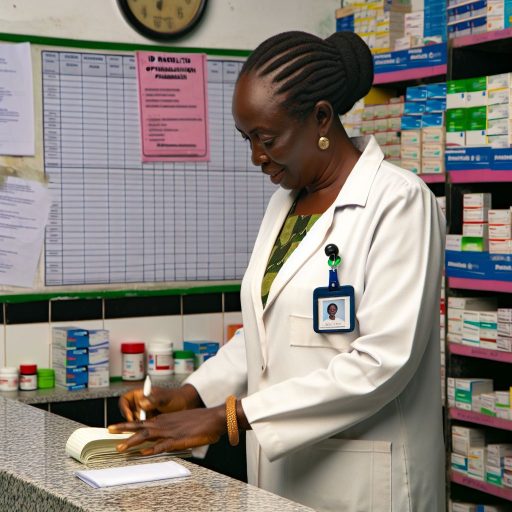Introduction:
In Nigeria, the healthcare system faces several challenges, including inadequate funding and infrastructure.
Pharmacy and medicine play a vital role in providing quality healthcare services to the population.
Education and Training:
- Difference in education requirements for pharmacists and medical doctors in Nigeria.
- Duration of study and specialization options in pharmacy and medicine.
Difference in Education Requirements:
Pharmacists in Nigeria typically undergo a 5-year Bachelor of Pharmacy (B.Pharm) program.
During this program, they are trained in pharmacology, pharmaceutical chemistry, and clinical pharmacy.
In contrast, medical doctors in Nigeria must complete a 6-year Bachelor of Medicine, Bachelor of Surgery (MBBS) program.
This program includes courses in anatomy, physiology, pathology, and clinical medicine.
After completing their respective degrees, pharmacists need to undergo a 1-year internship program to gain practical experience.
On the other hand, medical doctors must complete a mandatory 1-year housemanship program before they can practice independently.
Duration of Study and Specialization Options:
Pharmacy students in Nigeria typically spend 5 years in their undergraduate program.
Upon graduation, they have the option to pursue a Master’s or Ph.D. in Pharmaceutical Sciences for further specialization.
On the other hand, medical students in Nigeria spend 6 years in their undergraduate program.
After completing their MBBS, they have the option to pursue a residency program in various specialties such as surgery, pediatrics, or internal medicine.
Specialization in pharmacy often involves areas like clinical pharmacy, hospital pharmacy, or pharmaceutical research.
Medical specialization, on the other hand, allows doctors to focus on specific fields of medicine and develop expertise in those areas.
Scope of Practice:
Pharmacists in Nigeria play a crucial role in the healthcare system.
They are responsible for dispensing medications, providing drug information to patients and other healthcare professionals, and ensuring the safe and effective use of medications.
Pharmacists also offer medication therapy management services, such as medication reviews and counseling, to help patients achieve optimal health outcomes.
In addition, pharmacists in Nigeria are involved in activities such as drug procurement, inventory management, and quality control to ensure that medications are of high quality and safe for use.
Medical doctors in Nigeria are trained professionals who diagnose, treat, and prevent diseases.
They play a crucial role in providing medical care to patients, including conducting physical examinations, ordering and interpreting diagnostic tests, prescribing medications, and performing medical procedures.
Medical doctors also provide counseling and education to patients on disease prevention and management.
In addition, medical doctors collaborate with other healthcare professionals, such as pharmacists, nurses, and allied health professionals, to ensure comprehensive and coordinated patient care.
Medical doctors in Nigeria may specialize in various fields, such as internal medicine, surgery, pediatrics, and obstetrics and gynecology, to provide specialized care to patients with specific health needs.
By understanding the scope of practice of pharmacists and medical doctors in Nigeria, we can appreciate the unique roles and responsibilities each profession plays in the healthcare system.
Both pharmacists and medical doctors work together to provide quality care and improve patient outcomes.
Learn More: Latest Breakthroughs in Nigerian Toxicology Research
Licensing and Regulation:
- Process of obtaining a license to practice pharmacy in Nigeria
- Requirements for medical doctors to be registered with the Medical and Dental Council of Nigeria
Pharmacy Licensing Process:
In Nigeria, to practice pharmacy, individuals must first obtain a license from the Pharmacists Council of Nigeria (PCN).
Requirements for Pharmacy Licensing:
To be eligible for a pharmacy license, candidates must have a Bachelor of Pharmacy degree from a recognized institution.
Steps to obtain a Pharmacy License:
- Graduates must complete a one-year internship program in an approved pharmacy setting.
- After the internship, candidates must pass the PCN licensure examination to demonstrate competency.
- Upon passing the exam, individuals can apply for their license to practice as a pharmacist.
Medical Doctor Registration:
For medical doctors in Nigeria, registration with the Medical and Dental Council of Nigeria (MDCN) is mandatory to practice.
Requirements for Medical Doctor Registration:
Medical doctors must have a medical degree from a recognized medical school and complete a one-year internship in an approved hospital.
Steps to register with the MDCN:
- After the internship, doctors must pass the MDCN assessment exam to demonstrate their medical knowledge and skills.
- Once the exam is successfully completed, individuals can apply for registration with the MDCN.
- Medical doctors who meet all the requirements will be issued a practicing license by the council.
Comparison of Licensing Processes:
Both pharmacy and medicine licensing in Nigeria require completing an internship and passing a licensure exam.
Differences in Licensing:
Pharmacy licensing is overseen by the PCN, while medical doctor registration falls under the jurisdiction of the MDCN.
You Might Also Like: Career Paths for Pharmacists in Nigeria
When it comes to career opportunities, both pharmacy and medicine offer a wide range of options for professionals in Nigeria.
Job Prospects for Pharmacists:
- Community Pharmacy: Pharmacists can work in retail pharmacies, providing medication and health advice to the public.
- Hospital Pharmacy: Pharmacists can also work in hospitals, managing medication distribution and collaborating with healthcare teams.
- Manufacturing: Pharmacists have the opportunity to work in pharmaceutical companies, involved in drug production and quality control.
Opportunities for Medical Doctors:
- Private Practice: Medical doctors can set up their clinics, offering primary care services to patients in the community.
- Public Hospitals: Doctors can work in government hospitals, providing medical care to a large population and gaining diverse experience.
- Research Institutions: Medical professionals can engage in research activities, contributing to advancements in healthcare and medical treatments.
Both pharmacy and medicine hold promising career prospects in Nigeria, with opportunities available in various sectors to suit different interests and skills.
Find Out More: Pharmacology and Public Health in Nigeria: Connections

Salary and Earnings:
Pharmacists in Nigeria can expect to earn an average salary ranging from ₦150,000 to ₦500,000 per month.
Their earnings depend on their level of experience and expertise.
Medical doctors in Nigeria have a wide income potential.
This potential is influenced by factors such as years of experience, level of education, specialization, and location of practice.
Transform Your Career with Expert Guidance
Get personalized mentorship consulting that’s tailored to your unique path. Our expert advice is actionable and exclusive.
Get Started- Pharmacists’ salary range: ₦150,000 to ₦500,000
- Income potential for medical doctors varies
See Related Content: Nigeria’s Contribution to Pharmaceutical Chemistry Literature
Key Differences Between Pharmacy and Medicine in Nigeria
Pharmacy focuses on dispensing medications.
It also involves counseling patients on drug use.
In contrast, medicine involves diagnosing medical conditions.
Medical professionals treat various illnesses.
Importance of Pharmacy and Medicine
Both professions are crucial in the healthcare system.
Pharmacists ensure safe drug use and prevent errors.
Medical doctors provide essential diagnosis and treatment.
Together, they significantly contribute to the health of the population in Nigeria.
Additional Resources
The potential role of patent and proprietary medicine vendors …
Pharmacopoeial quality of drugs supplied by Nigerian pharmacies




